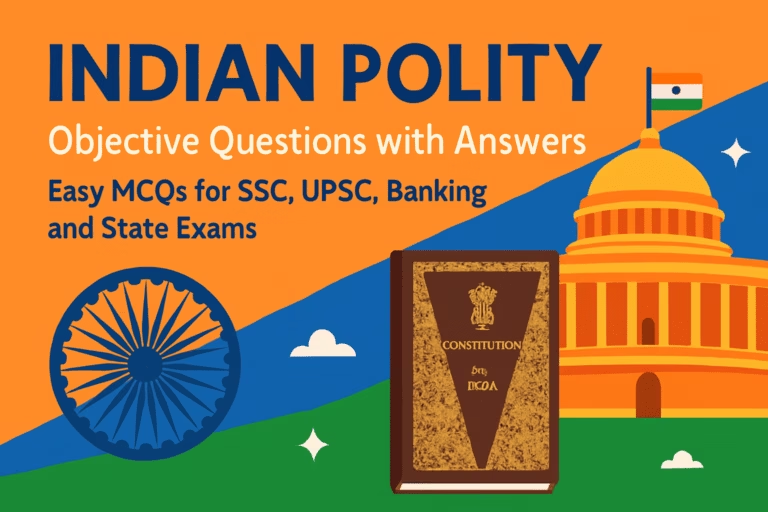Indian polity is an important subject that tells us how our country is governed; it tells us about its structure, laws, fundamental duties, and constitution. Through polity, we learn about our rights and obligations in this world. It is a core subject for competitive exams like UPSC, SSC, State PSCs, and other government exams. But remembering sections, rules, and amendments is very challenging. By practicing MCQs, you can easily revise and remember important topics like fundamental rights, directive principles, amendments, and election and government policies. We have prepared objective-type questions with answers on Indian polity for your quick revision.
-
On which date was the Constitution of India adopted by the Constituent Assembly after long discussions and debates?
a) 15th August 1947
b) 26th November 1949
c) 26th January 1950
d) 2nd October 1947
Correct Answer: (b) 26th November 1949 -
Which article of the Constitution gives citizens the “Right to Equality”?
A) Article 14
B) Article 19
C) Article 21
D) Article 32
Correct Answer: A – Article 14 -
The Preamble of the Indian Constitution declares India to be which type of state with equality and justice for all?
a) Monarchy
b) Sovereign Socialist Secular Democratic Republic
c) Federal Kingdom
d) Socialist Dictatorship
Correct Answer: (b) Sovereign Socialist Secular Democratic Republic -
The President of India is elected by which body through an indirect election process?
a) Citizens directly
b) Members of Parliament and State Legislatures
c) Supreme Court judges
d) Prime Minister only
Correct Answer: (b) Members of Parliament and State Legislatures -
The right to vote in India is available to every citizen after reaching which minimum age.
a) 18 years
b) 21 years
c) 25 years
d) 16 years
Correct Answer: (a) 18 years -
Who is considered the real executive authority in India, holding maximum decision-making powers?
a) President
b) Prime Minister
c) Governor
d) Chief Justice of India
Correct Answer: (b) Prime Minister -
Which amendment is called the “Mini Constitution”?
A) 44th Amendment
B) 42nd Amendment
C) 24th Amendment
D) 52nd Amendment
Correct Answer: B – 42nd Amendment -
In India, how many fundamental duties are mentioned in the Constitution after the 42nd Amendment?
a) 8
b) 10
c) 11
d) 12
Correct Answer: (c) 11 -
As per the Constitution of India, the governor of a state in India is appointed by whom?
a) Prime Minister
b) Chief Minister
c) President of India
d) Parliament
Correct Answer: (c) President of India -
During a national emergency, which article of the Indian Constitution provides for the suspension of fundamental rights?
a) Article 20
b) Article 19
c) Article 352
d) Article 14
Correct Answer: (b) Article 19 -
In the Indian Parliament, the Rajya Sabha is also known as what?
a) House of Commons
b) House of the People
c) Council of States
d) Legislative Assembly
Correct Answer: (c) Council of States -
Which schedule of the Indian Constitution contains the list of official languages recognized by the Union?
a) Fifth Schedule
b) Eighth Schedule
c) Ninth Schedule
d) Eleventh Schedule
Correct Answer: (b) Eighth Schedule -
In India, the Directive Principles of State Policy aim to establish what kind of social order?
a) Dictatorship
b) Welfare State
c) Capitalist State
d) Police State
Correct Answer: (b) Welfare State -
Which of the following best shows the democratic quality of India?
a) Power remains only with the King
b) People elect their representatives
c) Only rich people can vote
d) Citizens have no role in decision-making
Correct Answer: b) People elect their representatives -
Who has the authority to dissolve the Lok Sabha before the completion of its five-year term?
a) Prime Minister
b) President of India
c) Speaker of Lok Sabha
d) Supreme Court
Correct Answer: (b) President of India -
Which quality of India shows its respect for people’s voice and freedom?
a) Censorship of every opinion
b) Citizens cannot question leaders
c) Fundamental rights such as freedom of speech
d) No right to vote in elections
Correct Answer: c) Fundamental rights such as freedom of speech -
In the Drafting Committee of the Indian Constitution, who was the chairman of the
a) Jawaharlal Nehru
b) Sardar Vallabhbhai Patel
c) Dr. B.R. Ambedkar
d) Rajendra Prasad
Correct Answer: (c) Dr. B.R. Ambedkar -
Which Indian body conducts free and fair elections at both the central and state levels?
a) Parliament
b) Supreme Court
c) Election Commission of India
d) State Assembly
Correct Answer: (c) Election Commission of India -
According to the Indian Constitution, how many fundamental rights are guaranteed to its citizens?
a) 5
b) 6
c) 7
d) 8
Correct Answer: (b) 6 -
The Union Budget in India is presented every year in which house of the Parliament first?
a) Rajya Sabha
b) Lok Sabha
c) Both houses together
d) President’s office
Correct Answer: (b) Lok Sabha -
From which country’s constitution has the concept of single citizenship in India been borrowed?
a) USA
b) UK
c) Canada
d) Australia
Correct Answer: (b) UK -
By the people at the village level, which Panchayati Raj system is directly elected?
a) Zila Parishad
b) Gram Panchayat
c) Panchayat Samiti
d) District Council
Correct Answer: (b) Gram Panchayat -
Who is known as the “Father of the Indian Constitution”?
a) Mahatma Gandhi
b) B. R. Ambedkar
c) Jawaharlal Nehru
d) Rajendra Prasad
Correct Answer: b) B. R. Ambedkar -
According to the Constitution, who is the first citizen of India?
a) Prime Minister
b) President of India
c) Vice President
d) Chief Justice of India
Correct Answer: (b) President of India -
The Rajya Sabha is also known as—
a) House of the People
b) Upper House
c) Assembly House
d) Law House
Correct Answer: b) Upper House

